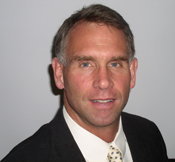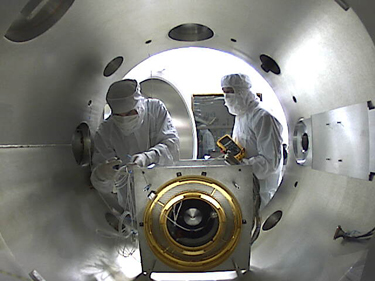Meet the IBEX Team: Herb Funsten

Dr. Herb Funsten loves his job so much that he doesn't consider it to be work. "I have so much fun at work, sometimes it is a hobby!" he said.
His "hobby" is to serve as the Acting Deputy Division Leader of the International, Space, and Response Division at Los Alamos National Laboratory in New Mexico. Herb collaborates on the IBEX mission as a Co-Investigator and leads the team of 10-15 people engineering the IBEX-Hi sensor. They are responsible for the design, development and delivery of the sensor, which will detect higher-energy neutral atoms. The sensor will work in tandem with the IBEX-Lo sensor to gather data that will allow scientists to create a global map of the Solar System's boundary.
This month, Herb and his team discovered a problem with some of the screws in IBEX-Hi during a test to simulate the extreme vibrations that occur during a rocket launch. "Some screws backed out of the detector subsystem, and that caused several other problems. Fortunately, the problems were isolated to one part of the sensor," Herb said. "The reason we test is to uncover any problems like this."
The screws damaged some of the foils in the detector, as well as some of the electronics. Luckily, NASA missions build in time to fix such problems before the launch date. "It set us back about a month, but we have top people working extremely hard on it. We have a recovery team in place, and we fixed the problem with the screws through a small redesign of the detector subsystem," Herb said. He anticipates that the instrument will be in final calibration by mid-July.
Minor setbacks like this are par for the course in space science. "The NASA instruments are one-of-a kind, and therefore, every one of them has its own unique challenges. We can't anticipate all the problems, and we are always ready to address any issues as they arise. Flexibility is key in NASA missions, and so is driving towards solutions as a team," he said.
Working through such challenges is one of the most satisfying parts of Herb's job. "I love learning, and I'm always learning because there are challenges every day. With both my technical and management parts of my job, I routinely face new situations, and I have to work through those situations and learn through them. I really enjoy that part," he said.
Herb enjoys other aspects of working in space science as well. "First of all, I enjoy working with great people. There are extraordinary people here at Los Alamos and on the IBEX team." He continued, "I love the process of discovery, and the creativity that drives it. I'm primarily an experimentalist, and I like building instruments, like mass spectrometers, that make difficult measurements. I also really enjoy leading and being associated with high-performance teams of people."
Being a scientist is the only job Herb ever imagined himself doing when he was a kid living in Williamsburg, Virginia. "I wanted to be a scientist. My father was a scientist; he was a high-energy physicist, and he opened my eyes to science. He always made science very interesting. I didn't know what kind of scientist I wanted to be, but I knew I wanted to be a scientist," he said.
To achieve his goal, Herb majored in physics at Washington and Lee University, and then earned a Ph.D. in engineering physics from the University of Virginia. After that, he furthered his training with a post-doctoral fellowship at Los Alamos National Laboratory, and has worked there ever since.
Of his schooling, Herb said, "My formal education helped me understand and be able to apply the scientific method. That's the deductive way of solving problems by developing a hypothesis and performing an experiment to test the hypothesis. And the formal education was certainly important in helping me understand the concepts of physics, math, materials science, and engineering. Then, when I went to graduate school and when I came here to Los Alamos, I got to apply what I learned in the classroom in the laboratory."
He offers this advice to today's students: "It's the same advice my dad gave me that's a recipe for success: do something that you enjoy and are passionate about, and do your best. You'll always be successful and have a good time doing it." Herb also recommends that students ask as many questions as possible of people in the field they plan to enter. He says, "No question is ever dumb; if you don't ask a question, you have missed an opportunity to learn."
Herb finds that one of the most fascinating things about science is not how much we know about the world and the Universe, but how much we still have yet to find out. "I think there's just so many discoveries that are waiting for discoverers. And many of these discoveries will be made by kids who are now in grade school and high school. Also, I think an important question associated with these discoveries is how do we use the science and technology to better society," Herb said.
His interest in science, however, goes beyond the thrill of discovery to its potential to improve the lives of humans. "My interest is beyond science for science's sake. Because I'm at Los Alamos, a national laboratory, I'm also interested in how science and technology can better our lives and improve society," Herb said.
Still, Herb gets excited about "how much fun science can be." He said, "The innovation and creativity that is required for science missions and performing science is amazing. We get to do a lot of really cool stuff and go to a lot of really cool places. We get to build instruments that go into space, to operate them in space, and watch the launches. And we get to meet people who've made some of the first discoveries in space, and actually get to work with them. Just the potential for discovery- and that there's so many things about the world that we don't understand- makes for exciting challenges every single day."
It's no wonder, then, that Herb sometimes finds his job to be just as interesting as his "real" hobbies: coaching his kids' soccer teams, skiing, hiking, and playing ice hockey.
